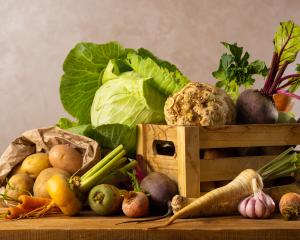A working bee of global proportions planned for the spring will put an emphasis on homegrown, organisers in Dunedin say.
Sustainable Dunedin City (SDC) is part of an international alliance promoting a global climate working bee for October 10 - dubbed the 10/10 Global Work Party - the follow-up to last year's big 350.org campaign, which highlighted dangers associated with carbon exceeding 350 parts per million in the atmosphere.
SDC committee member Jinty MacTavish says the focus in Dunedin for October 10 will be the "big green challenge", an initiative that aims to promote community-based initiatives that address any of the effects of oil dependency and climate change.
Last year, the Dunedin group organised a spring food festival as part of the pre-Copenhagen summit push to get international agreement around the 350 figure, and this year's push hopes to build on that.
"This year it's slightly different. The international team has called it the global work party. The community is being encouraged to undertake physical, tangible activities in their communities," Ms MacTavish says.
To help get things moving, the committee has $2000 to give away to community groups that either have a project under way, or want to get one started.
The committee is also keen to find other ways to help, by putting groups together with the resources they need - whether that is 500 spades, or 20 hours of volunteer time, or some expert advice or assistance on a more technical project, perhaps involving solar power.
There are four areas the committee has identified for particular emphasis this year, Ms MacTavish says.
They are food, transport, energy and water.
"I guess that we see it as a huge opportunity for communities to start to really look at their own reliance in terms of climate change and peak oil challenges and start to consider different ways that they can build up their own community networks and systems and start to become more resilient to those changes and the impacts those challenges might have on our city."
One way in which a community group might take on a food-related project would be to set up a community garden, she says.
Another possibility might be a bartering system for trading produce locally, or a seed-swap programme.
Initiatives to localise food production would reduce the carbon footprint, which is precisely what the big green challenge hopes to encourage.
With the prospect of peak oil increasing energy costs, it makes sense to cut transport costs where possible.
It is hoped school groups, among others, will get involved, Ms MacTavish says.
One school group Ms MacTavish spoke to recently came up with the three-pronged approach to addressing such issues - conservation, innovation and localisation.
"I just thought that was so brilliant to come out of 16-year-old brains."
There is evidence the wider Dunedin community is grasping the nettle, with more community gardens going in, she says.
Port Chalmers and Middlemarch already have gardens, one is being developed at John McGlashan College, another is planned for Musselburgh, while a programme to plant fruit and nut trees in Northeast Valley is under way.
"It is beyond these things just being good for the planet. People are really excited about reinvigorating communities and putting energy into re-establishing relationships between people," Ms MacTavish says.
"It can be a great thing for our communities, not just something that's good for intangible things - the planet, or the atmosphere or climate change."
Disasters around the world, including the flooding in Pakistan and the fires in Russia, are bringing yet more attention to the issues surrounding climate change, she says.
"The profile of those problems is starting to become greater. I think the scientists have known for a long time that this is urgent ... but the visibility of it has been increasing in recent times."
One of the members of the SDC committee, Paul Young, is part of the New Zealand youth delegation going to the next round of international climate change discussions in Cancun later this year.
That will give him the ability to take the stories of what is happening in Dunedin to the leaders assembled there, Ms MacTavish says.
For more info
Go to the website www.sustainabledunedincity.org.nz
Applications for funding for October 10 big green challenge day projects close on Friday, August 27, at 5pm.
The Sustainable Dunedin City annual meeting is on Wednesday, August 25, at 7pm, at the Community Church, corner of Filleul and St Andrews Streets.













